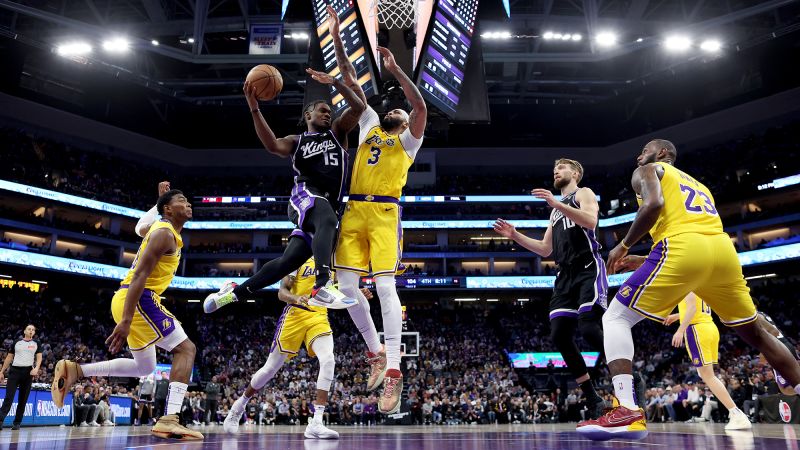Editor’s Note: A version of this article first appeared in the “Reliable Sources” newsletter. Sign up for the daily digest chronicling the evolving media landscape here.
David Zaslav famously said in 2022 that Warner Bros. Discovery doesn’t “have to have the NBA.” It appears Wall Street disagrees.
WBD’s already rock-bottom stock price plummeted nearly 10% on Tuesday after a report in The Wall Street Journal signaled the media conglomerate could be in for an expensive battle to maintain its NBA broadcast rights, with shares ending Tuesday at $7.36. That figure represents an all-time low for WBD, the parent company of CNN.
Industry insiders have repeatedly underscored how important it is for the network and WBD to retain the NBA broadcast rights. “It’s a must have,” a media executive stressed to CNN on Tuesday. WBD had an exclusive negotiating window with the NBA, but it expired earlier this month, allowing other companies, such as NBCU, to make bids.
The Journal report — authored by Joe Flint, Amol Sharma, and Isabella Simonetti — said that NBCUniversal “is prepared to pay an average of about $2.5 billion a year” to air a set of NBA games, effectively doubling the current fee paid by WBD. Under the proposal, NBCU would air some league games on its broadcast network, potentially in prime time, and on its Peacock streaming service. The bid threatens to eclipse WBD, which has aired NBA games on its cable network TNT, a longtime NBA partner and key component of the company’s business.
TNT has built a programming slate around the NBA games, most notably the highly rated ”Inside the NBA” show. In fact, Charles Barkley just signed a new, 10-year deal in 2023 with WBD. Andrew Marchand, now a journalist at The Athletic, reported at the time for the New York Post that the deal over a 10-year period is worth “well in excess of $100 million and could approach $200 million.” In other words, WBD has made significant investments hinging on maintaining the rights to the games.
While WBD maintains the rights to the NCAA March Madness tournament, as well as other sports such as the MLB, NHL and NASCAR, the NBA remains crucial to the media conglomerate. As The Journal pointed out, “Without the NBA, though, Warner could have a harder time charging distributors as much for carriage of its channels.”
Moreover, WBD just struck a deal with Disney and Fox Corporation to launch a forthcoming sports super-streamer. Losing the rights to NBA games could throw aspects of that business partnership into question. That’s not to mention WBD’s flagship streaming service, Max, has been advertising live sports to consumers as a key differentiator from other platforms. Losing the NBA would be a big blow to that pitch.
Spokespeople for both WBD and the NBA declined to comment.
Of course, it’s possible that WBD will overtake NBCU’s bid, or at least secure some NBA games. I’m told that WBD continues to sit at the negotiating table and has been having productive conversations. But given how cost-conscious Zaslav and chief financial officer Gunnar Wiedenfels have been in their management of the company, the current state of play is surely not a welcome development, which is reflected in the company’s share price.
A potential loss of the NBA rights could not come at a worse time for Zaslav, who has struggled to sell Wall Street on his vision for a one-stop, one-size-fits-all streamer to go toe-to-toe with Netflix. Since WBD first began trading on Wall Street in April 2022, the stock has lost roughly 70% of its value. While investors have been patient, shares plunging to a new all-time low on Tuesday can’t help.
The optics are anything but great, given that executives such as Zaslav and Wiedenfels have been handsomely paid as investors have watched their assets evaporate over the years. According to financial disclosures made public earlier this month, Zaslav’s 2023 compensation package grew to nearly $50 million, while Wiedenfels’ topped $17 million.
While Zaslav is grappling with an enormous set of challenges, he is not alone. Legacy media companies are struggling immensely to keep their heads above water as consumers cut the cord in favor of alluring streaming options, a revolution brought on by Netflix that has brought once towering giants to their knees.
Disney boss Bob Iger has openly spoken at length about the innumerable challenges he is navigating, and Paramount Global is engaged in merger talks with David Ellison’s Skydance Media as it fights to find a path forward for survival.
All of which makes sports rights even more crucial. Live sports are one of the final legs holding up the traditional cable television package, which has for years proved to be lucrative for companies such as WBD. As legacy media companies search for audiences and try to entice the public to sign up for their streaming platforms, securing these sports rights is as important as ever. And for Zaslav, whose company is struggling on Wall Street, the battle could not come at a more inopportune time.
As a second media executive told CNN on Tuesday, “The NBA becomes even more of a must-have when other aspects of the business are not working.”
Read the full article here




